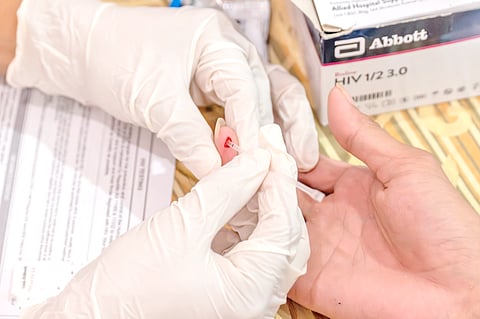
- NEWS
- the EDIT
- COMMENTARY
- BUSINESS
- LIFE
- SHOW
- ACTION
- GLOBAL GOALS
- SNAPS
- DYARYO TIRADA
- MORE

The World Health Organization (WHO) says the Philippines has the fastest-growing number of human immuno-deficiency virus cases in the Asia-Pacific region with at least 57 Filipinos finding out they have HIV per day. Around 252,800 Filipinos are estimated to be living with HIV this year, it adds.
The Joint United Nations Program on HIV/AIDS (UNAIDS) and the WHO support the Department of Health (DoH), its partners and communities in their efforts to reverse the rising trend of HIV cases in the country. Among the partners is Pilipinas Shell Foundation Inc. (PSFI), a grant recipient of the Global Fund which invests $5 billion per year to fight HIV, tuberculosis and malaria infections worldwide.
PSFI was nominated by the DoH secretary, the Philippine National AIDS Council and civil society groups as principal recipient of the grant from Global Fund which the foundation uses to implement the national HIV management strategy, explains Sebastian Quiñones, executive director of PSFI.
PSFI follows the 95-95-95 strategy espoused by the UNAIDS in controlling the spread of HIV. Quiñones says it means 95 percent of the HIV population should be identified, 95 percent of those identified are willing to undergo treatment, and 95 percent of those who undergo anti-retroviral therapy become non-reactive to HIV test.
For the Philippines, the rate currently stands at 95-63-62, he reveals.
‘We’re good in sensing the key population areas. Unfortunately, 63 percent of the 93 percent identified cases want to undergo treatment, and only 62 percent who underwent treatment become non-reactive,” according to Quiñones. “We’re now good in ensuring that we can test more, but the issue now is the second part. You really need to make sure that it (treatment) sticks.”
Quiñones attributes the high identification rate to PSFI’s outreach caravan.
“We go to various BPOs and for those who wish to know, we tell them, ‘You can come to us in private,’” he says.
PSFI has its HIV van.
“We have testing there and all the like. It’s like a lab. And we go to communities, we are willing to have folks come and be tested for free. And they can go there in private. There’s an entrance there so that they won’t be seen. And when they get tested, they will register,” according to the PSFI executive director.
HIV-positive people can be assisted by PSFI when they come out as treatment is free, covered by the three-year, $20-million grant from the Global Fund for the Philippines. Ironically, the country is still working on the parts of getting treatment and ensuring that beneficiaries become non-reactive.
“You have a cocktail of drugs that you need to do and you need to take it consistently. And if you don’t do that, of course, it doesn’t become as effective. So, that’s when the discipline and the stuff need to come in,” Quiñones says.
When patients undergoing treatment disappear, perhaps out of depression, PSFI tries it best to locate them again.
“But, of course, it’s like any person who has a sickness, they have to also have the desire to be able to undergo treatment,” he says.
